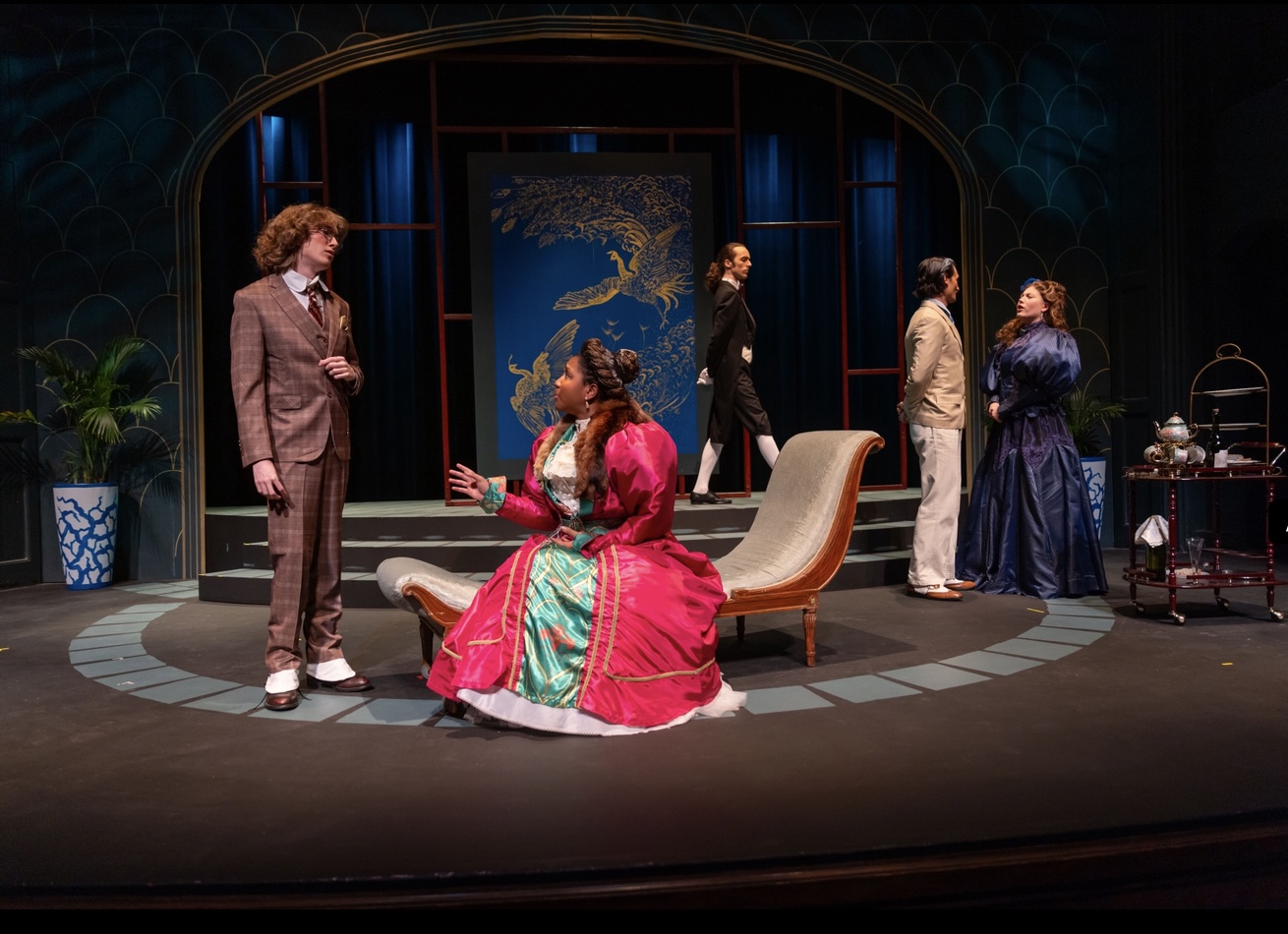The Importance of Being Entertained: University Theatre Department Presents Oscar Wilde Comedy

By Lindy Rybloom
This November, students and community members packed the seats of the Norton Clapp Theater, eagerly awaiting the magic of the fall mainstage play: Oscar Wilde’s light comedy, “The Importance of Being Earnest,” directed by Professor Sara Freeman.
Wilde’s most famous production — a commentary on Victorian social hypocrisy — was originally staged in 1895. The show follows two gentlemen, Jack Worthing and Algernon Moncrieff, who take on the identity of a man named Earnest in hopes of wooing their respective love interests. Cast member Anya Cavender (‘25) admits, “these two men do a lot of lying and deception to impress the women they are interested in.” Stumbling into problems and love along the way, both Earnests must learn to be truthful about their identities to find companionship. The theater students of Puget Sound gave new life to the 19th century show as they adapted it to the modern stage.
Arriving at performance weekend did not come easy, though. Cast member Isa Fitzgibbons (‘26) recalls rehearsing five days a week for hours at a time. She explains that the challenging process paid off once the cast began to “learn the spirit of the show” and “agree on the world that we were building together.” The cast of the show was small but mighty, with 10 actors in total. The limited cast size created a comfortable space for the crew to work in, and “because it was a relatively small group, we were able to get to know everyone” Fitzgibbons said. “There was a lot of camaraderie that came naturally.”
During the second weekend of production, the nation elected its 47th president. When asked about the merit in performing this show, Fitzgibbons said, “We had the unique opportunity of doing the show in a pretty tumultuous weekend for our country’s history. Being a human is complicated, interesting and exciting.”
Fitzgibbons suggests that rather than taking away from reality, theater “magnifies the pieces of ourselves that we need to be reminded of right now.” Amidst a divided country, the arts continue to unite people. “Theater as an art form demands people to be full of life, attentive and aware in a way that we crave, but I don’t think we know that we crave,” Fitzgibbons said.
As the house lights went down, the audience erupted in laughter almost instantly, bringing joy to lucky spectators on a historic weekend. In an unpredictable world, may we always remember to reach for humor and levity when we can.
Fitzgibbons transferred to Puget Sound this year, making this her first mainstage play at a new university. Puget Sound’s rich theater arts department attracted her because of its special attention to dramaturgy, the study of theatrical theory. The play’s director, Professor Sara Freeman, emphasizes establishing students as theater practitioners who are aware of dramatic composition. Fitzgibbons commented on Freeman’s teaching style, “so often we study theater from a concentrated point of view, dramaturgy gives the theater artist a comprehensive idea of not only the industry you are entering but the art form as a whole.”
Fitzgibbons’ character — unnamed and silent — helped explain the action on stage through displays of emotion and well-executed facial expressions. Oscar Wilde’s writing can be challenging for audiences to fully comprehend, and “because it is a comedy, some of the expository stuff tends to go over your head,” Fitzgibbons explained. With Freeman’s directorial assistance, Fitzgibbons’ character was able “to help fill in some of those blanks and make the overall process more understandable for the audience.”
For another student, the production of Wilde’s story was the first of many goodbyes during her senior year. Cavender, who played the central role of Gwendolyn Fairfax, described her character as a high-class city girl who knows how to navigate the world she exists in. “She is the pinnacle of high society,” Cavender said. Taking on the role of Miss Fairfax is Cavender’s last mainstage part before graduating in the spring with a degree in Theater Arts.
As Cavender took her final bow, she reflected on her four years spent engulfed in Puget Sound’s theater department. Her performing career began at five years old, participating in community and school productions until arriving at Puget Sound. “Theater is what kept me in school,” Cavender admits. “It has always been a huge part of my life.” Cavender recalls the joy she felt while acting in “The Importance of Being Earnest,” saying, “it was a wonderful last hurrah, and I got to do it with some of my best friends. I can graduate happy.”
Theater often provides a brief distraction from the outside world. For University of Puget Sound audiences, it is an educational space that offers refreshment. Cavender describes the intentional choice behind choosing Wilde’s work for the fall play. “It makes the audience think. If our name changes, how does that change us? How do we change ourselves to try to meet the demands of other people?” “The Importance of Being Earnest” is a play about grounding ourselves in the midst of chaos.
